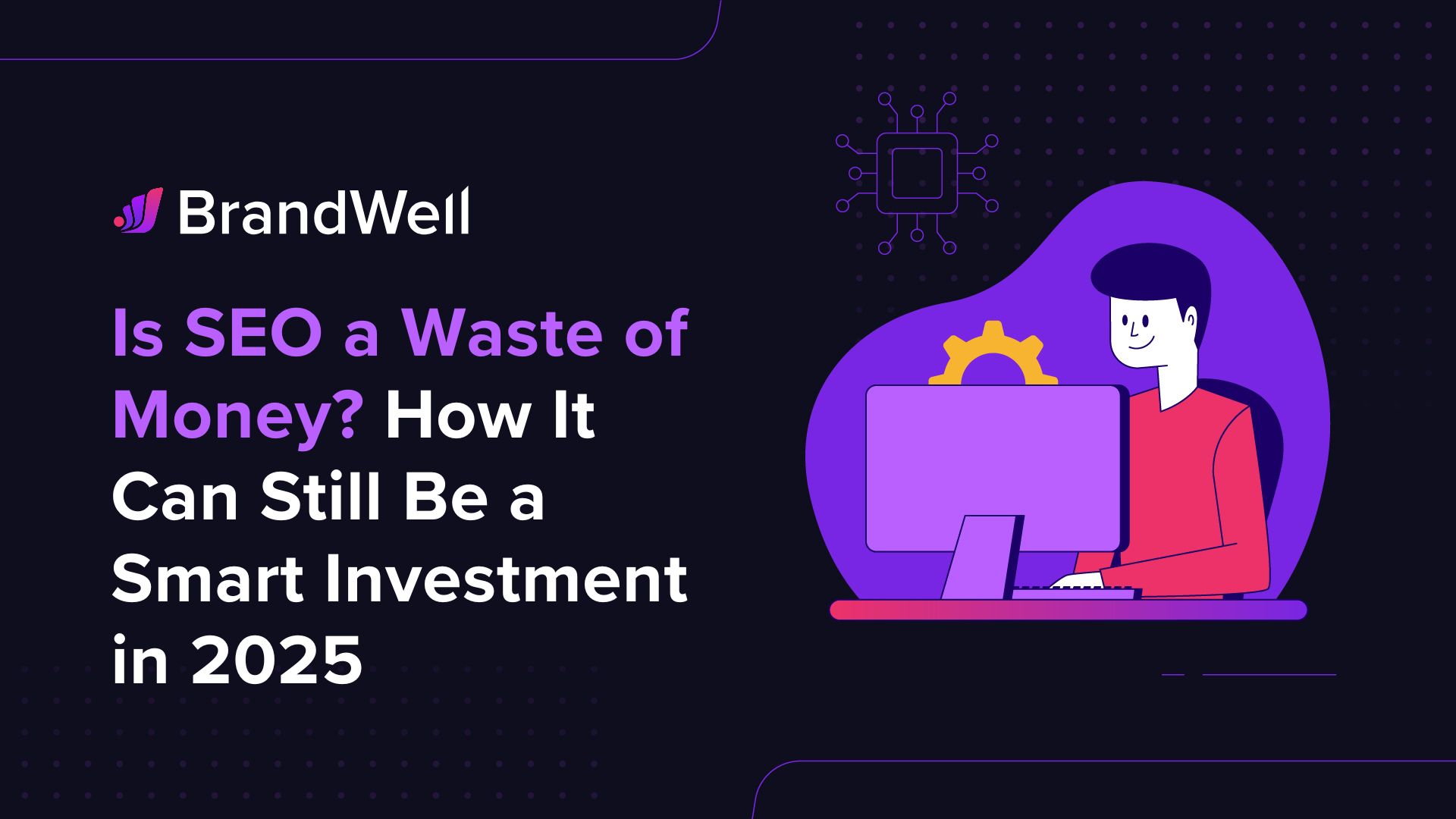You’ve heard the whispers. The doubts. The skepticism. “Is SEO a waste of money?” they ask.
You’re not sure what to believe anymore. After all, you’ve poured countless hours and dollars into optimizing your website, but the results don’t seem worth it.
I get it. I’ve been there. Questioning if all this SEO stuff is just a big, fat scam. But here’s the thing: SEO isn’t dead, and it’s definitely not a waste of money – if you do it right.
Listen up! I’m about to spill the beans on why SEO is still the secret sauce to crushing it online. Get ready to have your mind blown.
Table of Contents
Is SEO Dead or Still Worth It in 2025?
Is SEO dead in 2025? I get this question a lot. And honestly, it’s not a simple yes or no answer. SEO has evolved dramatically over the years, and what worked in the past may not cut it today.
But here’s the thing: SEO is far from dead. It’s just different now. And if you want to succeed with SEO in 2025 and beyond, you need to understand how it’s changed and what factors determine its value for your business.
Watch my full video here:
The Evolution of SEO Over the Years
I’ve been in the SEO game for a long time, and let me tell you, it’s been a wild ride.
Back in the day, SEO was all about cramming keywords into your content and building spammy backlinks. But those days are long gone.
In today’s SEO game, it’s all about crafting top-notch, relevant content that speaks directly to your target audience.
Forget the sneaky link-building tactics of yesteryear – Google’s algorithms have wised up and can spot subpar content from a mile away.
The key? Understanding what your audience is searching for and delivering the goods in a way that truly resonates.
Common Misconceptions About SEO
One of the biggest misconceptions about search engine optimization is that it’s a one-time thing. You optimize your site, and then you’re done. But that’s not how it works. SEO is an ongoing process that requires constant monitoring, tweaking, and adaptation.
Another misconception is that SEO is all about rankings. While rankings are important, they’re not the only metric that matters. You could rank #1 for a keyword, but if that keyword doesn’t drive qualified traffic or conversions, then what’s the point?
Is SEO a Waste of Money? Why Is It Not Working For You?
I’ve audited hundreds of websites over the years, and I’ve seen my fair share of SEO strategies that are just plain ineffective. If you’re not careful, you could be pouring your hard-earned money down the drain on tactics that don’t move the needle.
Here are some red flags to watch out for:
Focusing on the Wrong Metrics
It’s easy to get caught up in vanity metrics like search engine rankings and traffic. But if those metrics aren’t translating into leads, sales, or other meaningful business outcomes, then what’s the point?
I once worked with a client who ranked #1 for their main keyword, but their conversion rates were abysmal. Turns out, the traffic they were getting from search engines was totally irrelevant to their business. They were attracting people who were looking for information, not looking to buy.
The lesson? Don’t just focus on rankings and traffic. Focus on metrics that actually matter for your bottom line, like leads, sales, and revenue.
Neglecting User Experience
Here’s a hard truth: You could have the best content and the most authoritative backlinks, but if your website is a hot mess, you’re not going to see results.
Want to boost your SEO? Start with user experience. A clunky, slow-loading website is a surefire way to send visitors running for the hills. And when that happens, Google takes note – and not in a good way.
I’ve seen businesses spend thousands of dollars on SEO, only to neglect basic UX principles like mobile responsiveness, site speed, and intuitive navigation.
Don’t make that mistake. Invest in creating a seamless, user-friendly experience for your website visitors, and watch your SEO results soar.
Engaging in Black Hat SEO Tactics
Black hat SEO tactics like keyword stuffing, cloaking, and link schemes may give you a temporary boost, but they’ll ultimately do more harm than good. Google’s algorithms are getting smarter every day, and they can spot these shady tactics from a mile away.
Not only can black hat SEO tank your rankings, but it can also get your site penalized or even banned from search results entirely. And once you’re in Google’s doghouse, it can be incredibly difficult (and expensive) to get back in their good graces.
The bottom line? Stick to white hat SEO tactics that prioritize quality, relevance, and user experience. It may take more time and effort, but it’s the only way to build a sustainable, long-term SEO strategy.
Working with Scrupulous SEO Providers
Not all SEO services are created equal. There are a lot of snake oil salesmen out there who promise the moon and stars, but deliver nothing but empty promises.
I’ve seen businesses get burned by SEO agencies that use outdated tactics, cut corners, or simply don’t have the expertise to deliver results. They’ll charge exorbitant fees for “proprietary techniques” that are nothing more than smoke and mirrors.
If you’re thinking about hiring an SEO agency or consultant, do your due diligence. Look for providers with a proven track record of success, transparent reporting, and a commitment to ethical, white-hat tactics. And if something seems too good to be true, it probably is.

Getting SEO to Work for Your Business
So, what does a winning SEO strategy look like in 2025?
Staying ahead in 2025 means adopting innovative tactics and doubling down on what works. Let’s explore some modern strategies that can help you dominate search rankings while delivering exceptional value to your audience.
1. Prioritize Search Intent
Marketers and business owners often focus on ranking for the “right” keywords, but without understanding the why behind a search, even the best keywords can fall flat.
Search intent is what drives a user to type a query into Google. It’s the secret sauce for creating content that satisfies both your audience and search engine algorithms.
Before creating content, ask yourself:
What problem is the user trying to solve?
Is their intent informational, navigational, transactional, or local?
There are four types of search intent:
1. Informational Intent
The user is looking for information. Think blog posts, how-to guides, or explainer videos.
Example Query: “What is SEO?”
Content for this type of search intent should be actionable and easy to understand, such as beginner-friendly guides, long-form articles, FAQs, or tutorials.
2. Navigational Intent
The user knows where they want to go but needs help finding it.
Example Query: “Google Analytics login”
Ensure your website is optimized for branded searches and that navigational pages are easy to find.
3. Commercial Investigation Intent
The user is comparing options or researching before committing.
Example Query: “Best SEO platforms for small businesses”
Publish in-depth comparison articles, case studies, reviews, testimonials, or comparison charts to help users make informed decisions.
4. Transactional Intent
The user is ready to take action, like make a purchase or sign up.
Example Query: “Buy SEO tools online”
Build product pages, demo pages, and free trial sign-up pages with clear CTAs, optimized for conversions.

Image source: Moz
Prioritizing search intent is the foundation of modern SEO success. By focusing on what your audience truly wants and aligning your content to these intentions, you’ll attract more qualified traffic, improve engagement, and, ultimately, drive meaningful results for your business.
2. Conduct Smarter Keyword Research
Keyword research has always been a cornerstone of SEO, but in 2025, it’s no longer just about finding high-volume terms. It’s about understanding context, intent, and trends.
Smarter keyword research means getting into the mind of your audience and predicting their needs before they even type them into a search bar.
Here’s a step-by-step approach to smarter keyword research in 2025:
Focus on Search Intent First
Don’t just chase popular keywords. Think about why someone might search for a term and choose keywords that align with the type of content you’re creating.
For example: Instead of just targeting “SEO tools”, break it down into intent-driven queries like:
“Best SEO tools for small businesses” (commercial intent)
“How to use SEO tools” (informational intent)
Use AI for Keyword Discovery
AI tools have revolutionized keyword research by analyzing massive amounts of data quickly and efficiently. Platforms like ChatGPT, Semrush, and BrandWell can:
- Generate keyword ideas based on user behavior.
- Cluster related keywords by topic and intent.
- Predict emerging trends in your industry.
Go Beyond the Basics with Long-Tail Keywords
Long-tail keywords are longer, more specific phrases that capture highly targeted traffic. They may have lower search volumes but they usually convert better because they address niche needs.
Long-tail keywords also often align with voice search queries, which are increasingly common.
For example: Instead of targeting “SEO”, go for “local SEO tips for real estate agents in 2025”.
Optimize for Conversational Queries
With the rise of voice search and AI-powered assistants, people are using more natural language in their searches. Target questions and phrases that mimic how people speak, such as:
“What’s the best SEO strategy for small businesses?”
“How can I rank higher on Google this year?”
Use Competitor Analysis for Inspiration
Tools like Ahrefs and Semrush let you peek behind the curtain at your competitors’ keyword strategies.
Identify:
- Keywords they rank for but you don’t
- Content gaps you can fill
- High-performing keywords you can adapt for your audience
Track Trends and Stay Relevant
Use tools like Google Trends, AnswerThePublic, and industry-specific reports to spot trending topics. Jump on these opportunities early to create content that ranks before competition spikes.
For example: In 2025, AI-related searches like “How AI is changing marketing” or “AI-powered SEO tools” are hot topics.
Modern keyword research is not about chasing algorithms — it’s about understanding your customers, speaking their language, and delivering the solutions they need. The right keywords are your gateway to achieving that connection.
3. Embrace EEAT Principles
Google has made it clear that prioritizing high-quality, credible content is key to ranking success. For marketers and business owners, embracing EEAT principles is about more than appeasing algorithms — it’s about positioning yourself as a trusted leader in your field.
Let’s unpack the four pillars of EEAT and how you can integrate them into your SEO strategy:
Expertise
Google values content created by individuals or organizations with specialized knowledge in their field.
To demonstrate your expertise:
- Publish well-researched, in-depth content that showcases your knowledge.
- Use data, case studies, or original research to back up your claims.
- Keep your content updated to reflect the latest industry trends and insights.
For example: If you’re a financial advisor writing about retirement planning, consider including real-world examples, charts, and actionable tips based on years of experience.
Experience
Google emphasizes content written by people with firsthand experience. Highlight your real-world involvement by:
- Sharing personal stories, examples, or case studies.
- Including testimonials or interviews with subject matter experts.
- Demonstrating how you’ve solved problems or achieved results in your field.
For example: If you’re a travel blogger, share your detailed itineraries, photos, and personal anecdotes to build credibility and relatability.
Authoritativeness
Authority comes from being recognized as a go-to source in your niche. To build authority:
- Get backlinks from reputable websites and industry leaders.
- Highlight your credentials, partnerships, or certifications.
- Consistently publish high-quality content that attracts engagement and shares.
For example: A medical website can link to research studies, include bios for its authors with their qualifications, and collaborate with recognized healthcare professionals.
Learn how to build topical authority in this detailed guide.
Trustworthiness
Trust is the foundation of any strong online presence. To earn it:
- Secure your site with HTTPS and prioritize user privacy.
- Ensure your content is accurate, transparent, and unbiased.
- Include clear contact information, privacy policies, and terms of service.
- Encourage and showcase positive reviews and testimonials.
For example: An e-commerce site can build trust by displaying secure payment badges, offering transparent return policies, and featuring customer reviews.
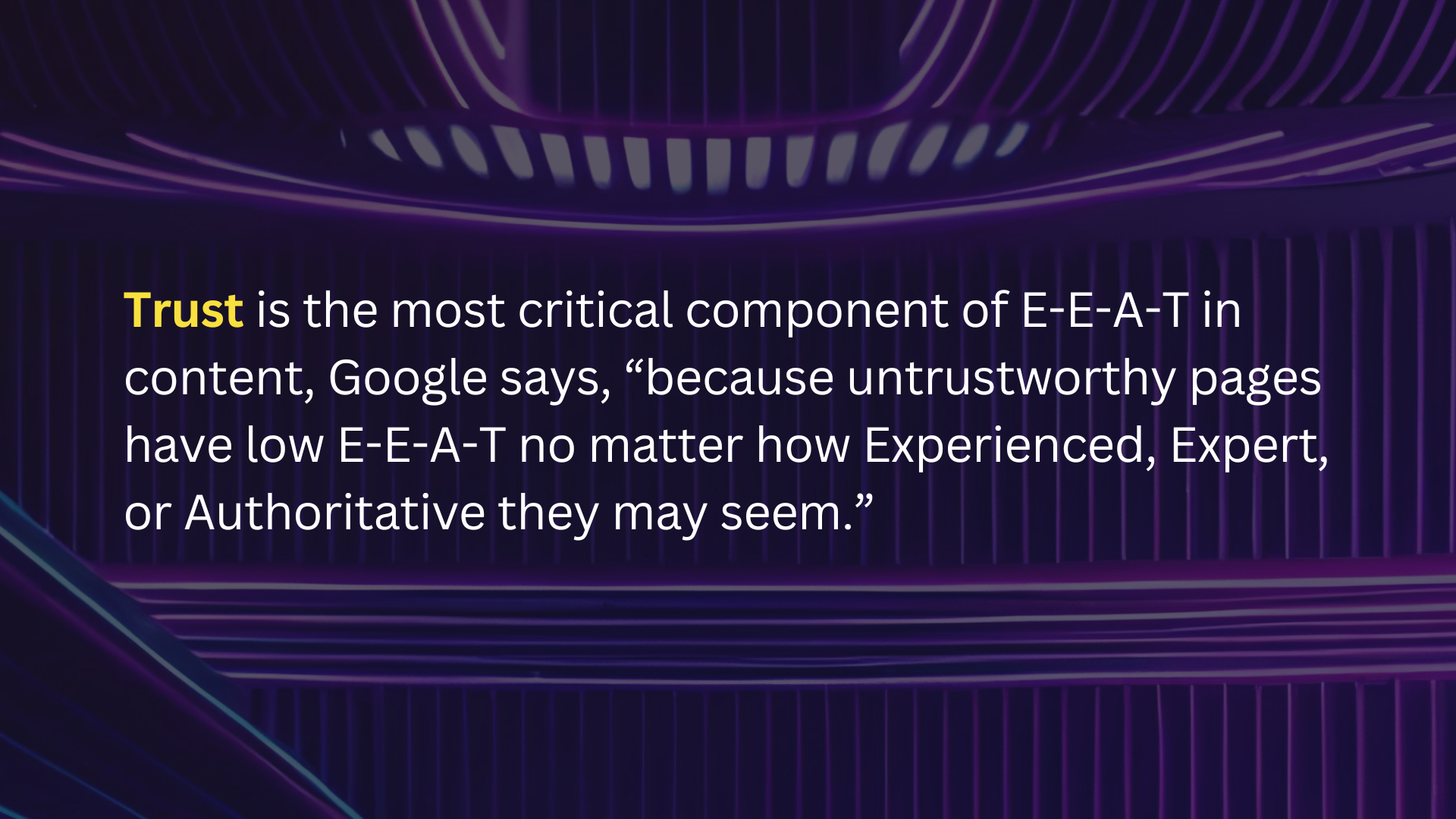
A few practical tips on how to weave EEAT principles into your SEO strategy:
Create Author Profiles: Each piece of content should include an author bio that highlights the writer’s credentials, experience, and expertise. This is particularly important for “Your Money or Your Life” (YMYL) topics like health, finance, or law.
Showcase Social Proof: Highlight awards, certifications, or partnerships on your site. Testimonials, case studies, and user reviews add credibility and encourage trust.
Get Cited by Reputable Sources: Earn mentions or backlinks from high-authority websites in your niche. This signals to Google that your content is valuable and reliable.
Audit Your Content Regularly: Outdated or incorrect information can harm your trustworthiness. Perform regular content audits to ensure all posts reflect current knowledge and industry standards.
Invest in Content Quality: Go beyond surface-level posts. Deeply research your topics and provide actionable insights that users can’t find elsewhere.
In 2025, EEAT is the gold standard for creating content that ranks and resonates. By showcasing your expertise, sharing your experiences, establishing authority, and building trust, you’re not just climbing the search rankings — you’re positioning your brand as an indispensable resource.
Remember, EEAT isn’t just about optimizing for Google. It’s about crafting content that earns the respect, loyalty, and trust of your audience. When your users trust you, search engines will too.
4. Create Local Content
In 2025, local SEO isn’t just for brick-and-mortar businesses — it’s a vital strategy for any company looking to connect with a geographically targeted audience. With search engines prioritizing hyper-relevant, location-specific results, creating local content is your ticket to standing out in your community and driving meaningful engagement.
Here’s how to build a local SEO strategy that puts your business on the map — literally and figuratively:
Claim and Optimize Your Google Business Profile
A well-maintained Google Business Profile (GBP) is the foundation of local SEO success.
- Ensure Accuracy: Keep your name, address, phone number (NAP), and business hours up to date.
- Use Photos and Videos: Showcase your location, team, and products with high-quality visuals.
- Post Regular Updates: Share news, events, promotions, or blog posts directly on your GBP.
- Leverage Attributes: Beyond NAP information, try to differentiate your page with features like family-friendly, pet-friendly, parking availability, accessibility, and anything else you think is useful to the customer and truly unique to your store.
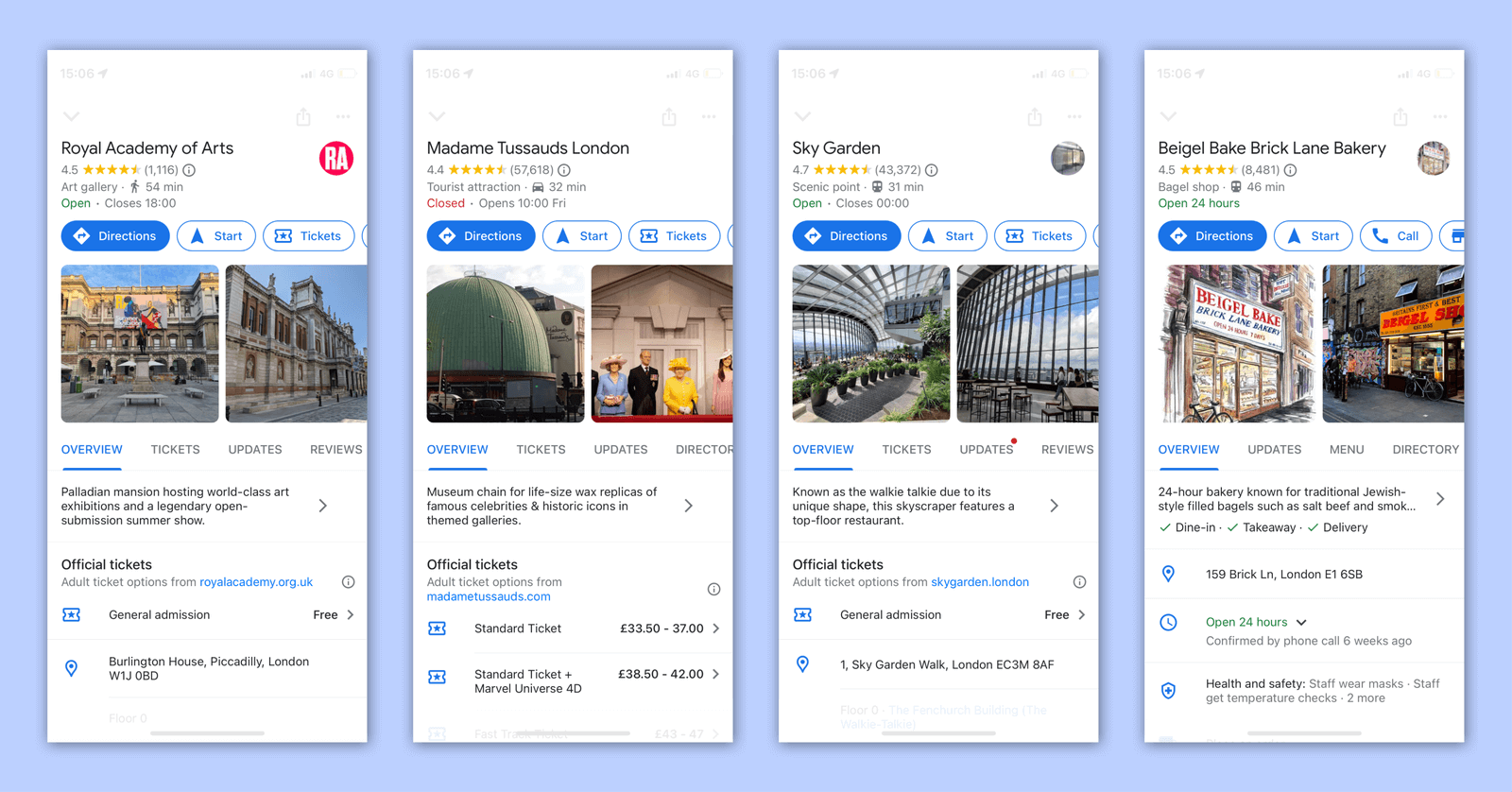
Image source: Buffer
Encourage Customer Reviews
Positive reviews don’t just boost trust — they directly impact your local rankings.
- Politely ask satisfied customers to leave reviews on Google, Yelp, or other platforms.
- Respond to every review, whether it’s positive or negative, to show you value feedback.’

Image source: Trustpilot
Target Local Keywords
Incorporate location-specific terms into your content to attract regional traffic.
- Use tools like Google Keyword Planner to find search terms people are using in your area.
- Combine primary keywords with local modifiers (e.g., “best Italian restaurant in Chicago”).
- Create content that answers specific local questions, such as “top things to do in Phoenix this weekend.”
Build Location-Specific Pages
If you serve multiple areas, create dedicated pages for each location. Include tailored content like addresses, maps, and unique services available at each location.
For example: A landscaping company with multiple service areas could have pages like “Landscaping Services in Austin” or “Garden Design in San Antonio.”

Image source: Semrush
Highlight Local Events and Partnerships
Show you’re part of the community by creating content around local events or collaborations.
- Sponsor events or partner with local businesses, and share those efforts online.
- Write blog posts or social media updates about your involvement.
For example: A bakery could create a blog post titled “5 Local Farmers’ Markets You Can Find Us At This Spring.”
Create Hyper-Localized Blog Content
Blogs are a great way to attract local traffic and build authority in your area.
Examples of local-focused content:
“A Beginner’s Guide to Hiking Trails in Denver” (for an outdoor gear store)
“5 Signs Your Roof Needs Repair in Seattle’s Rainy Climate” (for a roofing company)
Build Local Backlinks
Backlinks from local organizations, blogs, or directories signal to search engines that your business is trusted within your community.
- Partner with other local businesses for co-branded campaigns or events.
- Submit your website to local directories and niche-specific listings.
- Get featured in local news outlets or online publications.
Creating local content is one of the most effective ways to connect with your audience and grow your business in 2025. By targeting local keywords, leveraging local partnerships, and optimizing your online presence, you can dominate your local market and build a loyal community of customers.
Remember, local SEO isn’t just about rankings — it’s about relationships. When you show you’re invested in your community, your audience will invest in you, too.
5. Conduct a Technical SEO Audit
A beautifully designed website with compelling content is meaningless if search engines can’t find, crawl, and index it.
This is where technical SEO audits come in.
By identifying and resolving technical issues, you can ensure your site is performing at its best — providing a seamless experience for both users and search engines.
Follow these steps to conduct a technical SEO audit and keep your website running like a well-oiled machine:
Step 1: Check Crawlability
Crawlability refers to how easily search engine bots can navigate your site. Use tools like Screaming Frog or Google Search Console to identify:
- Broken links (404 errors)
- Orphan pages (pages with no internal links pointing to them)
- Blocked resources in your robots.txt file
The easiest way to check your website’s crawlability is to use the “URL Inspection Tool” within Google Search Console, where you can input a specific URL and see if Googlebot can access and index the page.
A green tick indicates a successfully crawled and indexed page, while grey indicates potential problems.
Key points about using the URL Inspection Tool:
- Access: Log in to your Google Search Console account and navigate to the URL Inspection Tool.
- Input URL: Enter the specific webpage address (not your website URL) you want to check.
- Information displayed: The tool will show you if the page is indexed, the last crawl date, and any crawl errors encountered.
- Troubleshooting: If issues are found, you can investigate further to fix any technical barriers preventing Googlebot from accessing your website.
💡Tip: Submit an updated XML sitemap to Google to ensure all key pages are indexed.
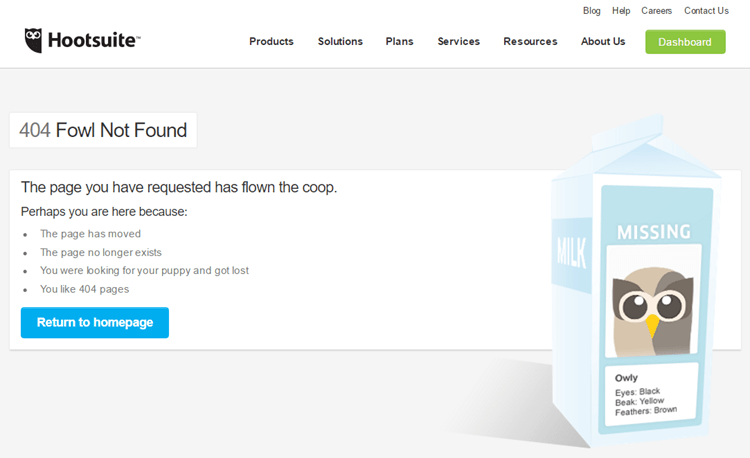
Image source: WordStream
Step 2: Analyze Site Speed
Site speed is a direct ranking factor and a key component of user experience. Slow-loading pages can lead to higher bounce rates. According to Google, the probability of bounce increases by 32% as page load time goes from 1 second to 3 seconds.
To analyze your website’s speed, you can use online tools like Google PageSpeed Insights, GTmetrix, Pingdom, or WebPageTest, which provide scores and detailed reports highlighting areas where your site can be optimized for faster loading times.
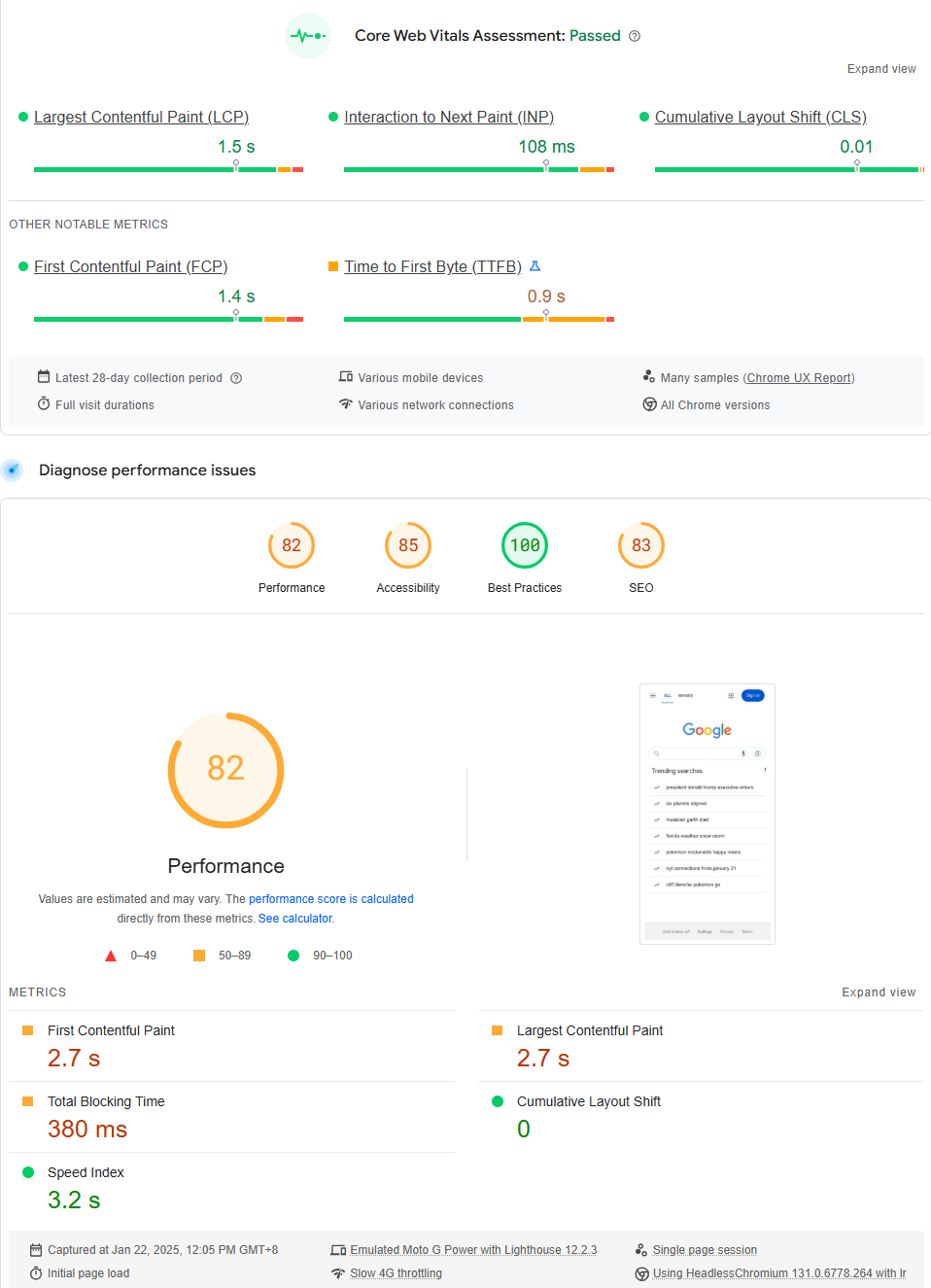
What to look for in a report:
- Load time: The total time it takes for a webpage to fully load.
- First Contentful Paint (FCP): The time it takes for the first bit of content to appear on the screen.
- Time to First Byte (TTFB): The time it takes for the browser to receive the first byte of data from the server.
- Caching: If your website is effectively using browser caching to store static files locally.
- CSS and JavaScript optimization: Whether your code is minified and properly delivered.
Step 3: Fix Crawling and Indexing Issues
Ensure that search engines can easily access and index your pages. Use Google Search Console’s “Crawl” and “Index Status” reports to identify errors like:
- Pages not indexed: If a page is not showing up in search results, check if it is being indexed by Google through the URL Inspection Tool.
- Redirect chains: Too many redirects on a website can prevent Googlebot from reaching the intended page.
- Broken links: Links that lead to error pages can hinder crawling.
- Poor internal linking: Lack of internal links between pages can make it difficult for Googlebot to discover all content on your site.
- Slow loading times: A slow website can discourage Googlebot from fully crawling your pages.
Resolve issues by:
- Fixing server errors
- Removing or redirecting low-value or duplicate pages
- Using robots.txt to block access to unnecessary pages, like admin panels or duplicate content
Step 4: Audit Your Site Structure
A clear and logical site structure helps search engines understand your content hierarchy. Screaming Frog, SE Ranking, and Serpstat are some of the best tools for auditing site structure.
Key steps in a site structure audit:
- Review sitemap: Check if the sitemap reflects a logical page hierarchy and organization, identifying any missing or incorrectly categorized pages.
- Analyze internal linking: Evaluate how pages are linked together within the site, ensuring important pages are well-connected and there are no orphaned pages with no inbound links.
- Assess navigation menu: Examine the clarity and usability of your website’s navigation menu, making sure it is intuitive and reflects the site structure.
- Examine URL structure: Ensure URLs are clean, descriptive, and accurately reflect the page content, helping users and search engines understand the page hierarchy. Check your URL structure for readability and consistency (e.g., no excessively long URLs).
- User flow analysis: Monitor how users navigate through the site, identifying any potential issues like confusing navigation or dead ends.
- Evaluate content relevance: Ensure each page has relevant and valuable content that aligns with its position in the site hierarchy.
Step 5: Secure Your Site with HTTPS
A secure website is essential for both SEO and user trust.
To secure your site with HTTPS, you need to purchase and install an SSL certificate on your web server, which enables encrypted communication between your website and visitors. This process typically involves contacting your hosting provider to initiate the installation and configure automatic redirects to ensure all traffic is routed through HTTPS.
Key steps to secure your site with HTTPS:
- Get an SSL certificate: Purchase an SSL certificate from a trusted provider.
- Install the certificate: Follow your hosting provider’s instructions to install the SSL certificate on your server.
- Configure redirects: Set up automatic redirects on your server to send all HTTP traffic to HTTPS.
- Update sitemaps: Ensure your sitemap reflects the HTTPS URLs for proper search engine indexing.
- Monitor security: Regularly check for vulnerabilities and update your website and plugins to maintain security.
Step 6: Review Canonical Tags
Prevent duplicate content issues by using canonical tags to indicate the primary version of a page.
To review canonical tags on a website, open the page in your browser, right-click anywhere on the page, select “View page source” (or similar depending on your browser), then use the search function (Ctrl+F) to search for “rel=canonical”.
The URL following the “href=” attribute will show you the canonical URL set for that page. Make sure it points to the intended preferred version of the page you want indexed by search engines.
Key points to check when reviewing canonical tags:
- Correct URL: Verify that the canonical URL points to the exact page you want Google to index, especially if you have multiple versions of the same content (e.g., with different URL parameters).
- Absolute URLs: Ensure the canonical URL is a full, absolute URL, not a relative one.
- Self-referential: If there’s only one version of a page, use a self-referential canonical tag where the canonical URL points back to the current page.
- Consistency: Check that canonical tags are implemented consistently across all relevant pages on your website.
Step 7: Audit Your Backlink Profile
Check for toxic backlinks that could harm your SEO performance.
Tools like Ahrefs, Moz Link Explorer, and Google Search Console can help you run a backlink audit and disavow harmful links.
Key steps in a backlink audit:
- Access your backlink profile: Input your website URL into your chosen tool to access your full backlink profile.
- Check the number of backlinks: Observe the overall volume of links pointing to your site.
- Assess link diversity: Analyze the variety of referring domains and anchor text to ensure a natural distribution.
- Look for unnatural patterns: Investigate sudden spikes in backlinks, excessive links from low-quality websites, or a high concentration of links from the same domain.
- Evaluate anchor text: Check for over-optimization with exact-match anchor text or irrelevant anchor text.
- Examine linking domains: Assess the quality and relevance of websites linking to you.
- Check where links are placed: Analyze if links are situated in natural content areas (like within articles) or in less relevant places like footers.
- Assess link relevance: Ensure links are from websites that are relevant to your niche.
- Identify toxic links: Use the tool’s filtering features to identify backlinks that could be considered harmful to your SEO. If necessary, submit a disavow file to Google Search Console to inform them about the links you want to disregard.
- Regularly check for new backlinks: Set up alerts to monitor new incoming links and identify potential issues early on.
A technical SEO audit is your website’s health check-up. By regularly identifying and addressing technical issues, you’ll ensure your site is fast, secure, and optimized for both search engines and users.
6. Optimize Your Site Structure
A well-optimized site structure isn’t just for search engines — it’s for your users, too. A logical, intuitive structure helps visitors find what they’re looking for quickly, improving their experience and keeping them on your site longer.
In 2025, as search engines become smarter and user expectations grow, optimizing your site structure is more important than ever.
Here’s how to refine your site’s architecture to boost rankings, engagement, and conversions:
Create a Logical Hierarchy
Your website’s structure should follow a clear hierarchy, starting with broad categories and narrowing down to more specific pages.
Homepage → Main Categories → Subcategories → Individual Pages
Here’s an example for an e-commerce site:
Homepage → Clothing → Women’s Clothing → Dresses → Evening Dresses
💡Tip: Use breadcrumbs to show users their path through your site and make navigation easier.
Streamline Navigation
Simplified navigation helps users find content quickly and ensures search engines can crawl your site.
- Limit your main menu to 5-7 primary categories.
- Use descriptive labels that clearly indicate what users will find (e.g., “Services” instead of “What We Do”).
- Avoid overly deep structures that require too many clicks to reach a page (3 clicks is a good rule of thumb).
Prioritize Internal Linking
Internal links connect related pages on your site, improving crawlability and directing users to relevant content.
Use internal links to:
- Highlight pillar content.
- Connect pages that share similar topics or keywords.
For example: A blog post on “Local SEO Tips” can link to your “Guide to Google Business Profile Optimization.”
Find more tips on how to create a network of internal links on your website.
Enhance Site Speed
A slow-loading site frustrates users and hurts your rankings. Optimize your site’s performance by:
- Compressing images and using next-gen formats like WebP
- Enabling lazy loading
- Minimizing CSS, JavaScript, and HTML files
- Enabling caching and using a Content Delivery Network (CDN)
Focus on Mobile User Experience (UX)
Mobile-first indexing means Google predominantly uses the mobile version of your site for ranking.
- Test your site with Google’s Mobile-Friendly Test Tool.
- Use responsive design to adapt your layout to different screen sizes.
- Ensure text is readable without zooming.
- Ensure buttons are tappable and clickable elements are not too close together.
- Test your site on different mobile devices for usability and performance issues.
- Make sure all content is accessible on mobile devices.
Check out Google’s complete guide on mobile-first indexing best practices.
Add Schema Markup
Schema markup (structured data) provides search engines with additional context about your content, enhancing your visibility in search results.
Implement schema for key elements like:
- Articles
- FAQs
- Products
- Reviews
- Events
For example: A product page with schema markup might display price, availability, and ratings directly in the search results.

Tools like Google’s Structured Data Testing Tool or Schema.org can help you validate your markup.
Eliminate Duplicate Content
Duplicate content can confuse search engines and dilute your rankings.
- Use canonical tags to indicate the primary version of a page.
- Consolidate similar pages or redirect duplicate URLs to the main page.
Monitor and Update Your Structure Regularly
A good site structure isn’t static. As your content grows, periodically review and update your structure to ensure it remains intuitive and efficient.
Here’s a list of tools to help you optimize your site structure:
- Screaming Frog SEO Spider: To audit your site’s structure and identify issues
- Ahrefs Site Audit: For a detailed analysis of internal linking and crawlability
- Google Search Console: To monitor indexing and discover errors
- Yoast SEO (WordPress): To add breadcrumbs and improve internal linking
Optimizing your site structure is about creating a framework that’s both user-friendly and search engine-friendly. By focusing on navigation, internal linking, mobile UX, and technical SEO, you can build a solid foundation for your site to thrive in 2025.
7. Build High-Quality Backlinks
Backlinks remain a cornerstone of SEO in 2025. These are not just links — they’re endorsements, signaling to search engines that your content is credible and worth ranking.
However, the days of quantity over quality are long gone. Today, it’s all about earning high-quality, relevant backlinks that genuinely enhance your site’s authority.
Here’s how you can build a strong backlink profile to improve your rankings and reputation.
Guest Posting
Guest blogging is a tried-and-true way to earn quality backlinks while showcasing your expertise.
- Identify reputable websites in your niche that accept guest contributions.
- Pitch unique, value-driven content ideas tailored to their audience.
For example: If you’re a digital marketing agency, you could contribute an article on “Emerging SEO Trends for 2025” to a marketing blog like Search Engine Journal.
💡 Tip: Always include a relevant link back to your site within the content or author bio.
Read our comprehensive guide on how to write guest posts that get approved quickly.
Build Resource Pages
Resource pages are curated lists of valuable tools, articles, or guides on specific topics. Getting featured on these pages can drive both backlinks and referral traffic.
- Search for resource pages in your niche using queries like “[your topic] resources” or “best [your niche] tools.”
- Reach out to the site owner, highlighting how your content or tool would add value to their list.
Leverage Broken Link Building
Broken link building involves finding broken links on other websites and offering your content as a replacement.
For example: If a marketing blog has a dead link to an outdated SEO guide, you can offer your updated guide as a replacement.
Key steps in broken link building:
- Find broken links: Use SEO tools like Ahrefs, Semrush, Moz, or Majestic to scan websites in your niche for broken links. Employ Google search operators like “site: [domain] “inurl:(broken keyword)” to identify potential broken pages.
- Analyze the broken link: Check if the broken link is relevant to your content and target audience. Assess the authority of the website where the broken link is found.
- Create replacement content: Find or create content on your site that closely matches the topic of the broken link. Ensure your content is high quality and more informative than the original.
- Outreach to website owners: Craft a personalized email explaining the broken link and why your content is a suitable replacement. Provide clear evidence of the broken link using screenshots or link checker results. Be polite and professional in your communication.
- Track your results: Monitor your backlink profile to see if your outreach efforts are generating new backlinks. Use tracking tools to measure the success of your broken link building campaign.
Partner with Local Businesses and Organizations
Collaboration with local entities can generate backlinks while strengthening your community presence.
- Sponsor events or charities in your area to earn a link from their websites.
- Partner with complementary businesses for co-branded campaigns or shared blog content.
For example: A local fitness center could collaborate with a health food store on a blog post about “Healthy Eating and Fitness Tips.”
Create Link-Worthy Content
Content that naturally earns backlinks is often the most valuable for SEO.
- Publish original research, case studies, or in-depth guides.
- Create visually engaging assets like infographics, videos, or interactive tools.
For example: A tech company could release a study on “The Impact of AI on Small Businesses,” which other sites might cite and link to.
Monitor Competitor Backlinks
Analyzing your competitors’ backlink profiles can uncover opportunities for your own site.
- Use tools like Ahrefs, Moz, or Semrush to see where competitors are earning backlinks.
- Identify patterns, such as frequently linked directories, blogs, or industry associations, and target those sources.
Harness Digital PR
Digital PR combines traditional public relations with SEO strategies to earn media coverage and backlinks.
- Pitch your expertise or business story to journalists and bloggers.
- Launch unique campaigns, such as surveys or contests, that grab attention.
For example: A sustainability-focused brand could run a campaign about reducing waste, earning press mentions and links from environmental blogs.
Best Practices for Backlink Building
- Focus on Relevance: Ensure the sites linking to you are related to your niche or industry. If a gambling site links to your content marketing site, ask the webmaster politely to remove it.
- Prioritize Quality Over Quantity: A link from a reputable industry blog is far more valuable than dozens from low-authority directories.
- Diversify Your Backlinks: Aim for a mix of links from blogs, news sites, local directories, and industry resources.
- Maintain a Natural Anchor Text Profile: Avoid over-optimizing anchor text with exact-match keywords; keep it varied and organic.
- Avoid Black Hat Tactics: Paid links or link schemes can result in Google penalties. Stick to ethical, white-hat methods.
Read about Google’s spam policies here.
Tools to Streamline Backlink Building
- Ahrefs: For competitor analysis, backlink monitoring, and identifying link opportunities
- BuzzStream: To manage outreach campaigns effectively
- Twitter: To connect with journalists and earn media coverage (Search hashtags like #PRRequest, #JournoRequest, or #BloggerRequest to find opportunities)
- Hunter.io: To find email addresses for outreach
High-quality backlinks are a powerful signal of trust and authority. By focusing on ethical, strategic link-building methods, you can boost your search rankings while creating valuable relationships in your industry.
8. Share on Social Media
In 2025, social media remains an essential tool for expanding your content’s visibility and driving traffic to your website. While social signals may not directly impact search engine rankings, a strong social presence can boost your SEO efforts by increasing brand awareness, fostering engagement, and attracting high-quality backlinks.
How do you boost your SEO strategies by participating in social media?
Tailor Content to Each Platform
Each social media platform has its own audience, tone, and preferred content format.
- LinkedIn: Share in-depth articles, industry insights, or case studies to reach professionals.
- Facebook: Post shareable content like videos, lists, and how-to guides.
- Twitter: Share quick updates, engaging headlines, and hashtags to attract readers.
- Instagram: Use visuals and Stories to promote blog content or highlight products.
- TikTok: Create short, entertaining clips that tie back to your content or business.
Use Attention-Grabbing Headlines and Captions
Your headline or caption is the hook that draws users in. Make it compelling by:
- Highlighting a problem your audience faces and offering a solution
- Using numbers or stats (e.g., “5 Easy Ways to Improve Your SEO in 2025”)
- Asking questions to spark curiosity (e.g., “Are you missing out on this key SEO trend?”)
Leverage Hashtags and Keywords
Hashtags make your content discoverable to a broader audience, while keywords align your posts with search queries.
- Research trending hashtags in your niche.
- Use location-based hashtags for local content.
- Keep it relevant — don’t overstuff your posts with hashtags.
Incorporate Visuals
Posts with eye-catching visuals perform better across all social platforms. Use high-quality images, infographics, or short videos.
For example: You can convert a blog’s key statistics into an infographic for Instagram. Tools like Canva make it easy to create professional visuals for any type of content.
Engage with Your Audience
Social media isn’t just a broadcasting tool; it’s a two-way street. Social networks provide you with the perfect opportunity to listen and respond to your audience directly.
- Respond to comments, questions, and shares promptly.
- Join discussions in relevant groups or communities.
- Host Q&A sessions, polls, or live streams to interact with followers.
Collaborate with Influencers
Influencers can amplify your reach by sharing your content with their engaged audience.
Some key aspects of collaborating with social media influencers:
- Identifying relevant influencers: Find individuals whose audience aligns with your target demographic and whose content style matches your brand image.
- Campaign strategy: Develop a clear plan outlining the goals of the collaboration, the type of content to be created (posts, stories, videos), and the compensation structure.
- Product gifting: Send influencers samples of your product to try and feature in their content.
- Sponsored posts: Pay influencers to create and publish content specifically promoting your brand or product.
- Brand ambassadorship: Establish long-term partnerships with influencers who consistently represent your brand across their social media platforms.
- Contests and giveaways: Collaborate with influencers to host giveaways on social media to generate excitement and engagement around your brand.
Repurpose and Promote Evergreen Content
Don’t let valuable content fade into obscurity — reshare your evergreen posts or break them down into bite-sized tweets or reels.
Repurposing evergreen content for social media is a smart way to get more mileage out of your existing assets while keeping your social channels active.
Here are some creative ways you can turn your evergreen blog posts into social media gold:
Create Infographics: If you have a blog post like “The Ultimate Guide to Keyword Research,” break down the key steps into a visually appealing infographic then share them on Instagram and Pinterest which are both image-focused platforms. You can also pin them to Pinterest boards with detailed descriptions and links back to the full guide.
Turn Lists Into Short Posts: A blog post about “Top 10 Local SEO Tips for 2025” can be broken down into a series of social media posts for Twitter or LinkedIn. Share bite-sized tips on Instagram Stories or Facebook posts with a call-to-action to read the full post on your site.
Add hashtags like #LocalSEO #SEOtips to increase discoverability.
Create Carousel Posts: For a post like “The Complete Guide to Content Marketing” or “How to Improve Your Website’s User Experience,” you can create a carousel on Instagram or LinkedIn that highlights key points or sections of the guide. Turn each slide into a summary of one actionable tip or insight from the blog post and then add a final slide with a CTA.
Create Video Snippets: A long-form blog post on “How to Conduct an SEO Audit” can be turned into multiple short videos. Record explainer videos for each section or step in the SEO audit process then share them as Instagram Reels, TikTok videos, or even YouTube Shorts. Add captions for accessibility and engagement. Each video can highlight a quick tip or step with a call to action to learn more by reading the blog post.
Share Quotes or Data Points: If you have a data-driven evergreen post, such as “The State of SEO in 2025” that includes statistics or interesting findings, pull those stats or quotes and turn them into quote cards for Instagram and Twitter. Share interesting data points or statistics in LinkedIn status updates to spark discussion. Include a call to action like “For more insights, check out the full report on our blog.”
Turn Your Evergreen Posts Into Polls or Quizzes: A post like “What’s Your Website’s SEO Score?” or “Find Out Which SEO Strategy Works Best for Your Business” can be repurposed as a poll or quiz. Create a simple poll on Twitter or LinkedIn asking followers to vote on topics covered in your blog then use tools like Typeform or Outgrow to create interactive quizzes that lead users back to the blog post for a deeper dive.
Share Case Studies or Success Stories: If your evergreen post includes case studies or success stories, pull quotes or highlights and turn them into social media posts. Share client testimonials or success metrics from the blog as visual posts on Facebook or Instagram. Post short video clips or carousel slides that tell the story of how the strategy or method in your blog post led to success. Don’t forget to include a link to the full case study on your site.
Create “How-To” Mini Guides: If your post is about “How to Create an Effective Content Calendar,” break it down into smaller step-by-step mini guides. Share each step of the process as an Instagram Story with a quick caption explaining the action. Post step-by-step slides or tips on Twitter, linking back to the full post. Encourage followers to share their own results after following your steps.
Host a Live Q&A or Webinar: If your evergreen content covers a broad topic, like “SEO Basics for Beginners,” host a live Q&A on Instagram Live, Facebook Live, or YouTube to address questions from your followers. Announce the live session with a teaser post linking back to the blog. After the live event, share the recorded session and add a CTA to the blog post for further reading. You can also break down key moments from the webinar and create social clips.
Share User-Generated Content: If your blog post encourages action — like creating a content marketing strategy — ask your followers to share their experiences or results. Feature user-generated content (UGC) on your social channels, such as people commenting on or implementing strategies from your blog post. Encourage users to tag your business when they post, creating a continuous cycle of engagement and social proof.
Repurposing evergreen content is a fantastic way to maximize your existing assets and keep your social media channels fresh and engaging. By adapting content to fit the format and preferences of each platform, you not only increase your content’s lifespan but also drive more traffic to your site and generate more leads.
Social media is a powerful ally in your SEO strategy. By strategically sharing and promoting your content, you can drive traffic, earn backlinks, and build brand authority — all of which contribute to better search performance.
9. Leverage AI for Smarter SEO
In 2025, AI is no longer a buzzword in marketing. Artificial intelligence has become so entrenched in our daily lives that we use it for just about any task: analyzing user behavior, researching keywords, scheduling social media posts and emails, generating metadata, and even writing entire blog posts.
If you’re still doing things manually and have not made the switch to automation, then you’re going to be left behind. AI simply makes everything easier, faster and more effective.
Let me show you how you can leverage AI for smarter SEO.
Automate Tedious Tasks
AI can take care of repetitive, time-consuming tasks, allowing your team to focus on strategy and creative work.
Examples:
Content Optimization: Tools like BrandWell analyze your content and suggest SEO improvements such as keyword density, internal linking, and content structure.
Here’s a screenshot of BrandWell’s optimization audit report, which you can generate while you are editing your blog post:
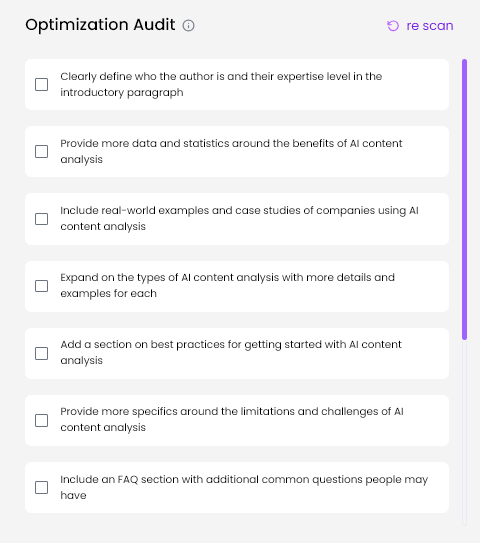
Meta Descriptions and Titles: AI tools like BrandWell can quickly generate SEO-friendly meta descriptions and titles, taking the tedious task out of your hands so you can focus on the meat of your content.
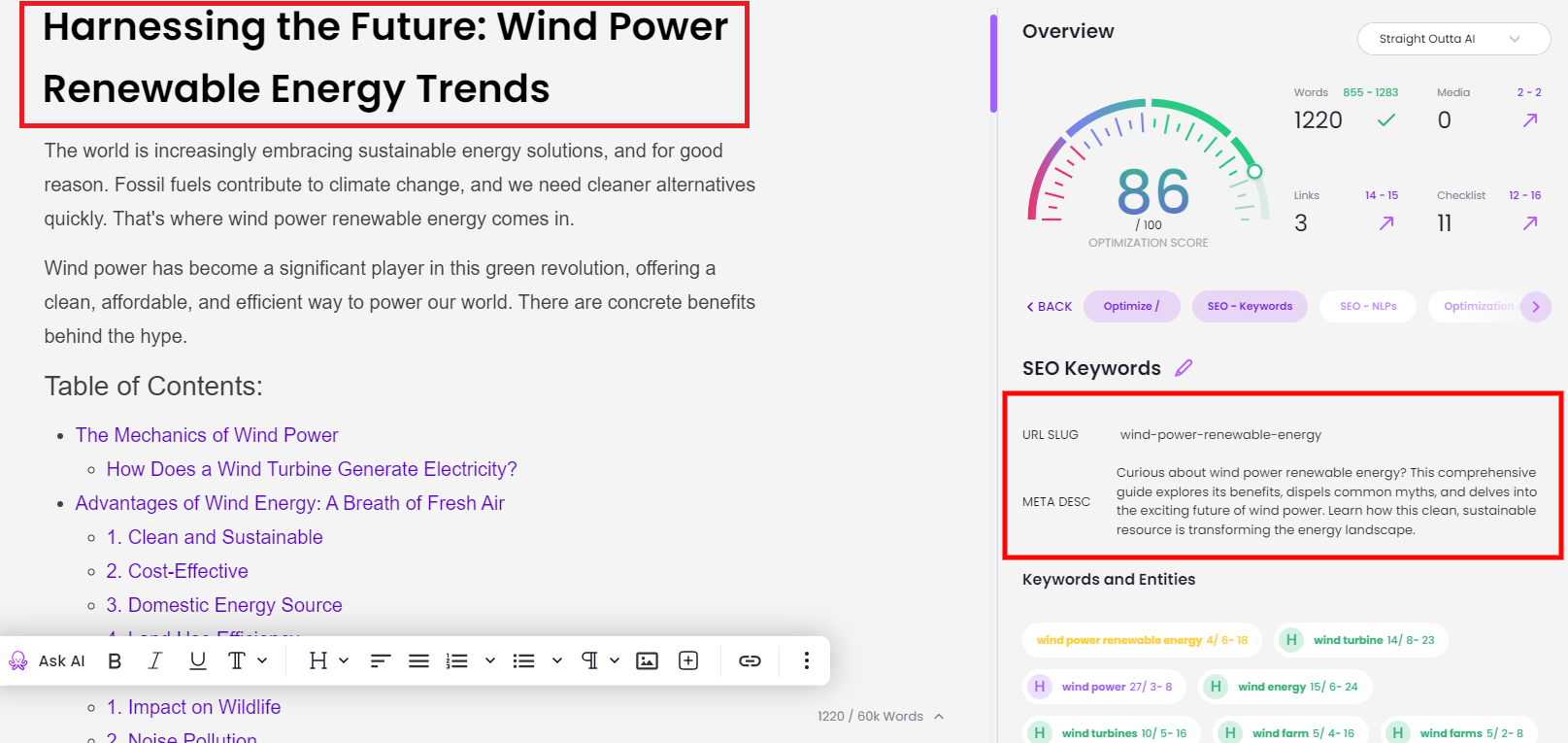
💡Tip: Use AI to automate your content audits, keyword tracking, and competitive analysis, which will give you more time to focus on growing your content strategy.
Analyze Search Patterns and User Behavior
AI-powered tools can analyze search patterns and user behavior, giving you deep insights into what people are actually searching for and how they interact with your site.
Examples:
Google Analytics: Use AI to track user interactions, identify trends, and recommend changes to your site based on real-time data.
AI-driven Keyword Research: Tools like BrandWell, Ahrefs and Semrush can help you discover long-tail keywords and emerging trends based on search volume, intent, and competition.
Here’s an example of a keyword report from BrandWell:
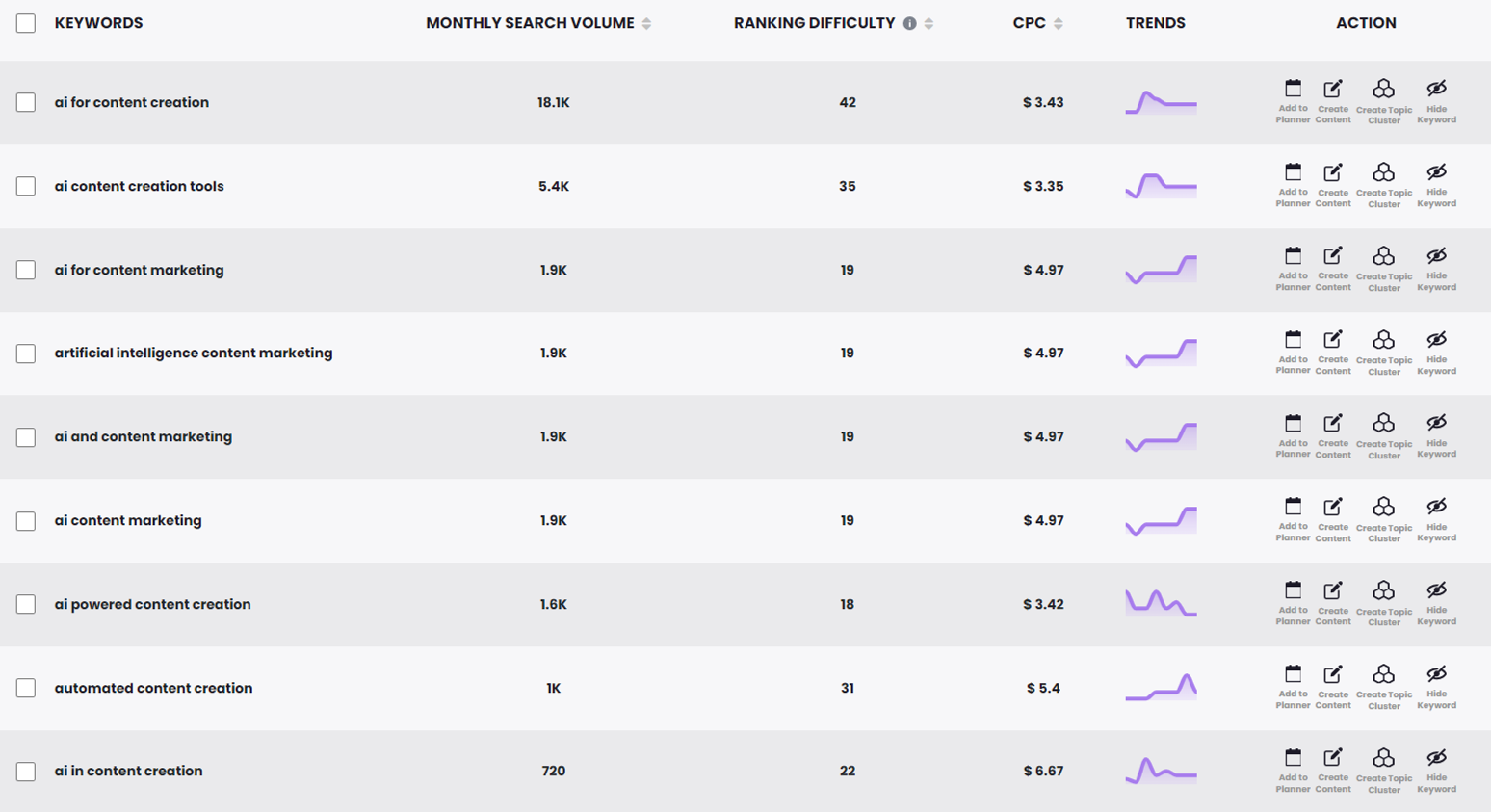
💡 Tip: By using AI to analyze how users are navigating your site, you can uncover opportunities to improve your content, enhance the user experience, and increase conversions.
Generate Ideas, Draft Outlines, and Create Content
Content creation is a significant part of SEO, and AI is making it easier than ever to produce high-quality, relevant content.
Examples:
Content Idea Generation: Use tools like BuzzSumo or AnswerThePublic powered by AI to generate content ideas based on what users are searching for in your industry.
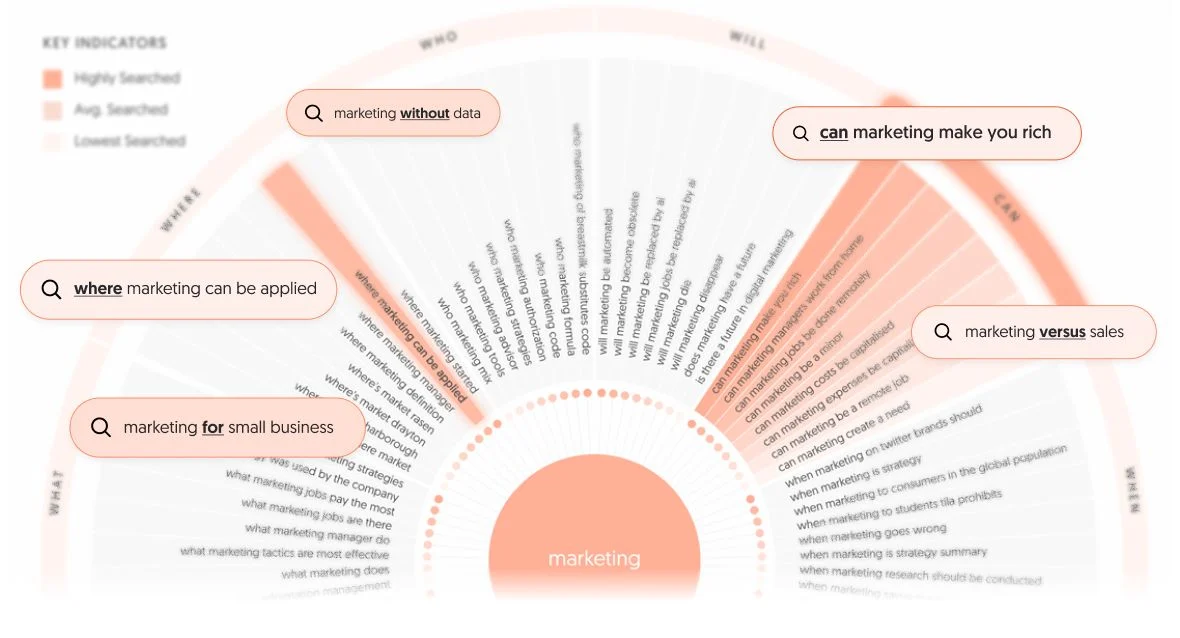
Outline Creation: AI tools like ChatGPT can help you create detailed content outlines based on your target keyword and user intent.
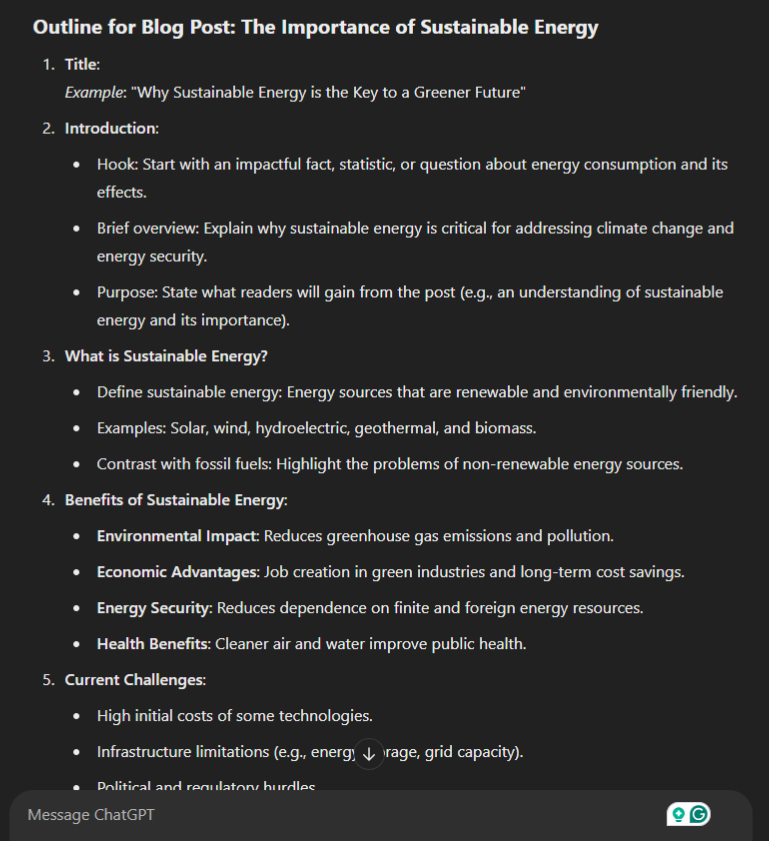
Content Creation: Let’s face it, creating great content is a challenge. You can’t just scratch the surface and expect to make an impact. It takes hours of research and a genuine desire to understand your audience on a deeper level. But the good news is AI is here, and tools like BrandWell helps streamline content creation, generating draft posts and SEO suggestions you can refine before publishing.
As you can see from the screenshot below, you can enter the keyword you want need a content for and the AI will generate a full blog post that’s almost ready to publish. Plus, you get a full suite of SEO tools to help push your content to the top of search engine results.
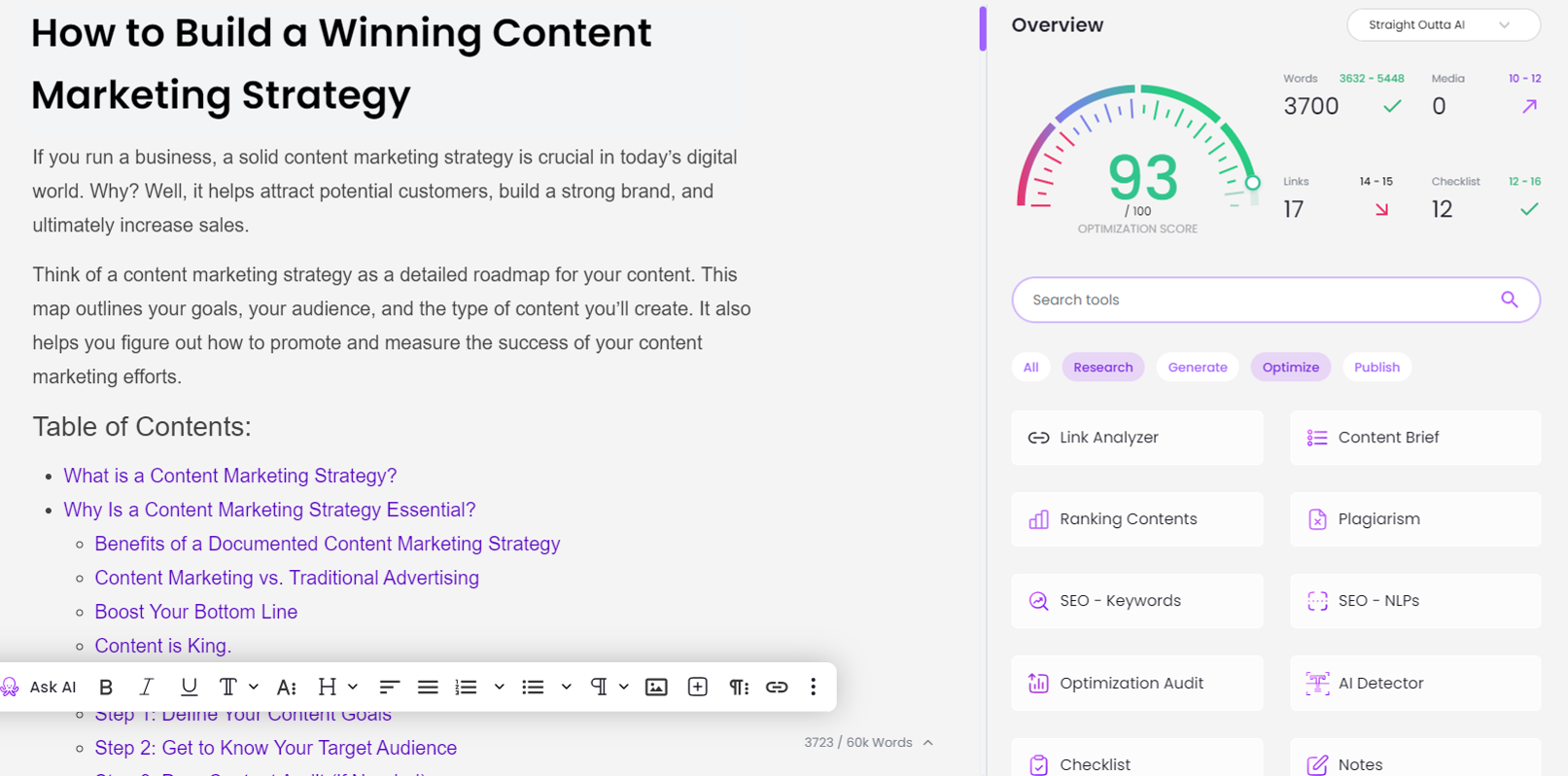
But don’t simply rely on AI. Everyone loves a good story, and the best way to engage your audience is to weave in real-world examples, success stories, and personal experiences to your AI content to drive your message home and truly connect with your readers.
Visuals like photos, videos, and infographics can also help keep your audience engaged and break up walls of text.
💡Tip: Use AI to assist with content ideation, drafting, and even repurposing your existing content into different formats (e.g., turning a blog post into a YouTube video script or an infographic).
Improve Personalization and User Experience
AI can help you deliver a highly personalized user experience by understanding individual user behaviors and preferences.
Examples:
Dynamic Content Recommendations: Platforms like OptinMonster and HubSpot use AI to recommend personalized content to users based on their past behavior and preferences.
Chatbots and AI Assistants: Integrating an AI-powered chatbot (like Drift or Intercom) can enhance user engagement by answering common questions, guiding users to relevant pages, and gathering valuable insights for your SEO efforts.
💡 Tip: Use AI to tailor product recommendations, blog posts, and even personalized email campaigns that speak directly to the needs and interests of your audience.
Predict SEO Trends and Stay Ahead of Competitors
One of the most powerful capabilities of AI is its ability to predict SEO trends, giving you a competitive edge.
Examples:
Forecasting Search Demand: AI tools like Clearscope help you anticipate changes in search demand, so you can refine your keyword strategy and stay ahead of competitors.
Competitor Analysis: AI can track your competitors’ rankings, content strategies, and backlink profiles to give you a comprehensive overview of their SEO efforts. Tools like SpyFu use AI to track competitor performance and identify opportunities for you to capitalize on.
Learn more by reading our complete guide on how to master competitor analysis for SEO.
💡 Tip: Use AI-powered predictive tools to anticipate changes in search trends, so you can refine your strategy early and maintain a competitive advantage.
In 2025, using AI tools for SEO isn’t just an option — it’s a necessity to stay competitive. By embracing AI systems to automate tasks, understand trends, and improve user experiences, you’ll not only streamline your efforts but also gain a significant edge in the SEO race.
The Future of SEO
SEO is a never-ending game of cat and mouse. Google’s always changing the rules, so what worked like a charm yesterday might fall flat tomorrow. Keep your ear to the ground and be ready to switch things up at a moment’s notice.
That means keeping a close eye on your analytics and staying up-to-date on the latest SEO news and trends. When an algorithm update hits, you need to be ready to pivot your strategy and make adjustments as needed.
Algorithm updates can be a blessing in disguise. If you’re quick on your feet and willing to adapt, you can leave your competition in the dust and come out on top. It’s all about staying flexible and seizing opportunities as they arise.
To win Google’s heart, pour your energy into crafting content that’s relevant, authoritative, and trustworthy. When you consistently deliver value to your audience, algorithm updates become your ally, not your enemy.
So, is SEO a waste of money? Absolutely not.
When done right, SEO is a powerful tool that can skyrocket your online visibility, attract hordes of qualified leads, and make your cash register sing.
Here’s the thing about SEO: it’s not a quick fix. You’ve got to put in the work, the time, and the brainpower to make it happen.
Sprinkling keywords around like fairy dust? Not gonna cut it.
SEO success takes patience and a solid game plan.
One tip I always give my clients is to focus on creating content that’s genuinely helpful and informative. Don’t just stuff keywords into your pages for the sake of SEO. Create content that solves a problem or need and the rankings will follow.
FAQs: Is SEO a Waste of Money?
Is it worth it to pay for SEO?
Absolutely. Paying for SEO boosts your site’s visibility, drawing more traffic and potential customers.
Is SEO worth it anymore?
Yes, SEO is still a game-changer. It drives organic traffic that’s crucial for long-term business growth.
Is SEO dead in 2025?
No way. It evolves but remains key in getting your content seen by the right eyes online.
Should I spend money on SEO?
Spend wisely. A smart investment in SEO can lead to significant returns over time.
Elevate Your SEO Strategy in 2025 with BrandWell
The SEO landscape in 2025 is more dynamic and competitive than ever. Implementing a robust SEO strategy takes time, expertise, and the right tools. That’s where BrandWell comes in.
BrandWell is your ultimate AI-powered SEO assistant, designed to take the complexity out of SEO and empower your business to thrive online. Whether you’re a marketer, business owner, or content creator, BrandWell provides an all-in-one solution for optimizing your digital presence.
Why Choose BrandWell?
With BrandWell, you can:
- Streamline Your SEO Efforts: Conduct comprehensive website content audits, perform smarter keyword research, and generate detailed topic reports — all in one place.
- Create High-Quality Content: Craft everything from long-form blog posts and optimized metadata to short-form content like social media posts, newsletters, and product descriptions.
- Optimize Like a Pro: Get actionable optimization audits to boost your SEO score and improve user experience.
- Publish Effortlessly: Seamlessly integrate with WordPress for hassle-free content publishing.
- Stay Ahead with AI: Leverage AI technology to generate personalized, SEO-friendly content that aligns with user intent.
Take Your SEO to the Next Level
Ready to simplify your SEO workflow and achieve measurable results? Let BrandWell handle the heavy lifting while you focus on growing your business.
Sign up for BrandWell today and unlock the potential of AI-driven SEO. Transform your website, boost your rankings, and perform better on the search engine results pages — all with one powerful tool.
👉 Start your free trial with BrandWell now!
With the right strategies and tools, you can strengthen your SEO in 2025. BrandWell can help guide the process. Let BrandWell guide the way to your digital success. 💻✨

